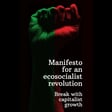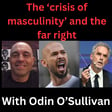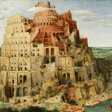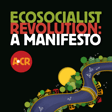Become a Creator today!Start creating today - Share your story with the world!
Start for free
00:00:00
00:00:01

Introduction to Marxism Part Two: Sociology (with Ian Parker)
Ian Parker takes looks at the social theory of Marxism, in particular classes, the struggle between them and their relationship to politics. The second in a three part series of introductions to Marxism from AntiCapialist Resistance.
Transcript
Introduction to Marxism: Order, Progress, and Class
00:00:01
Speaker
This is the second part of an introduction to Marxism. The first part focused on philosophy and the second part deals with sociology, specifically with order, progress and class.
00:00:20
Speaker
The third part deals with economics and gives some general conclusions.
00:00:27
Speaker
We learned from the philosophical foundations of Marx's work that our understanding of the struggle for socialism must involve the overcoming of alienation and it must be dialectical, it must be materialist.
00:00:47
Speaker
Marxists are historical materialists. And so when we're faced with different ideas about what socialism is and how to get there, we have to deal with some contradictions.
00:01:00
Speaker
We also have to deal with sociological ideas about what socialism is.
Contradictions in Socialism and Marx's Analysis of Power
00:01:07
Speaker
We need to understand traditional and more radical ways of looking at order, progress and class.
00:01:17
Speaker
The most important contradiction in this case is the opposition between, on the one hand, fixed ideal schemes or blueprints for implementing socialism, on the other hand, the movement or ongoing political struggle for it.
00:01:37
Speaker
Blueprints are of course limited to what exists at the moment, to present day conditions, and so Marx is suspicious of any such utopian socialist schemes.
00:01:51
Speaker
He is instead concerned with how we can move beyond current conditions, how we can emancipate ourselves by anticipating and building an alternative to capitalism.
00:02:07
Speaker
So Marx notices and and aims to overcome the split between current conditions and our struggle for a way forward in different ways. For example, in 1852, when discussing the coup in which Louis Bonaparte seized power the previous year, 1851,
00:02:29
Speaker
Marx comments that, I quote, the tradition of all dead generations weighs like a nightmare on the brains of the living. And this comment follows his historical materialist argument that people make their own history. And Marx emphasizes that they do not make it as they please.
00:02:51
Speaker
They do not make it under self-selected circumstances. But he says, under circumstances existing already, given and transmitted from the past.
00:03:05
Speaker
There were material conditions for the historical emergence in Europe of hopes for liberty, for human freedom, for the grand social schemes through which a more perfect society might be put in place.
Bourgeoisie and Labor: Ideology and Enlightenment
00:03:22
Speaker
So the bourgeoisie, that is the capitalist class, was coming to be more and more influential than dominant. That bourgeoisie owned the raw materials and machines and the factories, the means of production and consumption.
00:03:42
Speaker
Their rise to power redefined labour itself. no longer labour as directly under the control of the feudal lords, but now ah wage labour.
00:03:59
Speaker
Peasants were becoming wage slaves, compelled to sell their labour power and selling it as if by free choice, as if there was a free contract between themselves and those they sold their labour power to.
00:04:16
Speaker
So bourgeois democratic movements championed that kind of false contract and individual choice. And here you see very clearly how that fiction of individual choice operates ideologically, how the ruling ideas are the ideas of the ruling class as Marx argued.
00:04:40
Speaker
The bourgeoisie certainly made choices about employment, investment and growth. Impelled by the need to maximise profit, they experienced those choices as freely made.
00:04:53
Speaker
Their experience of the world flowed from their class position and, as ideology, was relayed down to the working class they had created, a class that needed to sell its labour power.
00:05:09
Speaker
So these are the material conditions for the flowering of the Western Enlightenment, of Western Enlightenment thought that was setting itself against the absolutist monarchies that stood at the head of feudal societies.
00:05:28
Speaker
the bourgeoisie now promoting individual liberty the promise of consciously planned human freedom and in those conditions you have german philosophers like emmanuel kant giving us one of the mottos of the new order in Europe, that was, have the courage to use your own understanding.
00:05:49
Speaker
That was Kant's answer to the question, what is enlightenment?
Positivism and Marxism: Social Order and Progress
00:05:55
Speaker
And alongside this, you have the early French sociologists like Auguste Comte,
00:06:01
Speaker
aiming to construct a ah scientific religion of humanity to construct a positive or positivist as he called it account of society positivist was comf's scientific new word So social scientific understanding of the world, Comte thought, would counter the disorder that he had seen in the 1792 French Revolution and would set out clear stages of social development.
00:06:34
Speaker
Comte's project was summed up by his followers in the watchwords still inscribed on the Brazilian flag, order and progress. So Marx is here in the time and place of the Western enlightenment, writing and intervening, working at the contradiction between individual liberty and social order.
00:07:00
Speaker
And what Marxism gives us is a way of dialectically, practically resolving and transcending that contradiction between individual liberty and social order.
00:07:14
Speaker
In order to do that, we need to deal with the question of structure or the kind of order that was necessary for capitalist society to implant itself.
00:07:26
Speaker
And with the question of historical progress and the dizzying perpetual change that capitalism opens up.
Capitalism vs. Marxism: Labor and Abstraction
00:07:36
Speaker
What we see in that process is that capitalism is simply concerned with how labour power can be put to work to finally realise profit.
00:07:47
Speaker
Capitalism is only concerned with abstract labour and it's indifferent to useful or concrete labour. We have to take care though not to then assume that marx himself is against abstraction, that he's against what is abstract, that he only prizes and wants us to prize what is concrete, that he wants us to return to that.
00:08:16
Speaker
No, what is concrete for Marx is itself something already to be conceptualised, grasped, he says, in its many determinations.
00:08:29
Speaker
What is concrete for Marx is not like a lump of concrete to be directly observed and measured, but it's given reality for us by its relation to other things.
00:08:43
Speaker
At the same time, it's absolutely necessary for any analyst of capitalism or anything else for that matter, any scientist. to work with abstract categories like labour or the working class.
00:09:01
Speaker
and We'll see this most clearly when we look at what class is for Marx, and we'll arrive at that by looking at how abstract categories like order and progress have to be grasped by us and examined concretely in their many determinations as they exist in relation to other things.
00:09:26
Speaker
So let's look in a little more detail at order and then progress and then at the key Marxist category of social class. First, order.
00:09:41
Speaker
We now know that Marxism always homes in on contradictions.
00:09:49
Speaker
Social order under capitalism is riddled with contradiction between the realm of the individual, ah realm of free choice that is promised and promoted, but always impossible to fully realize, and the collective.
00:10:06
Speaker
The collective is a realm of human freedom, the conditions for which are created by capitalism, which is continually systematically blocked.
00:10:18
Speaker
so I'm going to focus here on four material and ideological instances of order under capitalism.
Critique of Utopian Socialism and Class Dynamics
00:10:27
Speaker
Utopian schemes, workers' organisation, the capitalist state and the nuclear family.
00:10:36
Speaker
First, utopias as order. The phrase utopian socialism is actually Marx's own phrase levelled as an accusation against social reformers who propose visions of egalitarian forms of order of ideal societies.
00:10:58
Speaker
These seemingly ideal societies would not only dissolve exploitation in favour of cooperative, harmonious participation, but would, the reformers claim, also solve the contradictions between the exploiters and the exploited?
00:11:17
Speaker
As if. In place of that kind of disorder that arose of times at social unrest, there would be social order. And this was exactly the nub of the problem for Marx.
00:11:32
Speaker
For the utopian socialists wished away not only social unrest, but also the deep structural conflicts that characterize capitalism.
00:11:46
Speaker
The utopian socialist reformers imagined that they could step above and beyond class conflict. In practice, many of them dreamt up their schemes from the standpoint of the bourgeoisie.
00:12:01
Speaker
Some of the schemes were mere blueprints with no plan for putting them into practice. Some were enacted as communities that were either crushed because they posed a threat to capitalist property rights or neutralized and absorbed when they had to compete in the marketplace, which is the fate of most cooperatives.
00:12:24
Speaker
and some were enclosed factory sites that were set up by the social reformers, the benefactors who ran them on a top-down basis in accordance with capitalist principles.
00:12:35
Speaker
So these schemes were effectively versions of bourgeois law and order. What about workers' self-organisation?
00:12:47
Speaker
Workers' self-organisation as a form of order. And Marx was not against order or organizations, and neither were the anarchists who Marx squabbled with in the first international.
00:13:01
Speaker
Most of the anarchists in fact complained about the caricature of their own political projects a romanticizing chaos. And they actually looked to a deeper social order based on the cooperative nature of human beings.
00:13:17
Speaker
What was at stake for them was how a new social order could be built out of the ruins of the chaotic cutthroat free market system.
00:13:30
Speaker
For Marx that required building on the collective experience of the working class which was forced together by mass industrial production welded together as a social force So workers' collective self-organisation should be democratic and accountable against the dictatorship of the bourgeoisie.
00:13:55
Speaker
So in place of that kind of dictatorship, the dictatorship of the bourgeoisie would be a social order run by and for the working class. and the alternative social order was characterized by Marx in a much mit much misunderstood phrase borrowed from one of his comrades the dictatorship of the proletariat it simply means rule by the working class by us for us for that self-organized labor to develop
00:14:27
Speaker
Organisations needed to be built now under capitalism. Those organisations included, crucially, labour unions and political parties independent of the ruling class, those forging an understanding of the world independent of bourgeois ideology.
00:14:46
Speaker
For Marx, such political organisations also needed to transcend national borders needed to be international. That meant continual struggle against capitalist forms of social order that entered the working class by way of bourgeois ideology against the effects of the material benefits obtained by representatives of labour organisations.
State, Revolution, and the Bourgeois Family
00:15:11
Speaker
So you see, bureaucracy was an endemic problem that was always present in the separation of a privileged layer of representatives with their own particular organisational interests.
00:15:27
Speaker
This brings us to the question of the state. The danger was that workers' organisations would replicate rather than oppose the forms of social order that are essential for protecting large private property and ensuring control of the means of production under capitalism.
00:15:50
Speaker
Those dominant forms of social order are crystallized in the state apparatus which lifts a section of the population out from the working class, from direct production and gives them all manner of privileges and a little bit of power.
00:16:10
Speaker
The lower levels of the state are staffed by the working class, by those still in contact close familial and community contact with their class, but these people are too often usually obedient to the bureaucracy and to their masters at higher levels of the apparatus who are more closely tied to the bourgeoisie.
00:16:34
Speaker
The state apparatus is also, when it comes down to it, at times of crisis, it is a body of armed men tasked with restoring social order.
00:16:46
Speaker
And so the state, for Marxists, is always ah ruling class state. That's why Marx draws the conclusion that in order to achieve a revolution against capitalism, the state must, he says, be smashed, broken up by the working class.
00:17:06
Speaker
That state apparatus operates as a mechanism that appears to stand above society, simply ensuring social order, but it actually functions to in ensure the smoothest possible running of capitalism.
00:17:23
Speaker
As Marx and Engels put it in the 1848 Communist Manifesto, the executive of the modern state is but a committee for managing the common affairs of the whole bourgeoisie.
00:17:40
Speaker
Now we come to the family as a form of order.
00:17:45
Speaker
We owe to Frederick Engels a first historical materialist analysis of the place of the family in the constellation of power relations that enable capitalism to function.
00:18:00
Speaker
The bourgeois nuclear family is a form of order essential to capitalism and it links the political economic system of production to patriarchal power, that is the power of men.
00:18:16
Speaker
The family is a kind of refuge from capitalism and it seems to be a private space but it's also a little prison under the command of someone enjoying some of the power that they're denied in their alienated lives in the outside world, usually the father.
00:18:36
Speaker
Engels analyzes the rise of private property way before the development of capitalism. That first private property, he says, is a prerequisite for capitalism to develop much later, and it's intimately linked to the formation of the first state apparatus.
00:18:58
Speaker
The state apparatus guarantees the right to private property, the first instance of which is woman. Woman is one of the chattels, property of men.
00:19:09
Speaker
So this linking of the origins of private property, the family and the state is proto-feminist as well as Marxist analysis.
00:19:21
Speaker
It opens the way to later analysis of production in the family, oh social reproduction, which as capitalism becomes globalized also operates through global care chains that bind women into capitalism
00:19:43
Speaker
We've briefly focused here Utopias, organization, the state and the family as material and ideological instances of order under capitalism.
00:19:56
Speaker
And this Marxist account of order has a number of political consequences, including the contradiction between individual and collective action.
00:20:09
Speaker
So let's note three points about this contradiction before we move on.
Individualism vs. Collective Action: Capitalism's Paradox
00:20:16
Speaker
First, we need to notice the individualizing effects of capitalism, that individualization which is in line with what capitalists might experience of their own economic choices.
00:20:32
Speaker
It also intensifies alienation for those of us who must sell our labor power to survive. And among the many ideological effects, it distracts attention away from systemic structural analysis towards conspiratorial explanations for the misery we experience. So it's as if individuals are also behind the scenes pulling the strings.
00:21:02
Speaker
Such conspiracy theories are toxic for working class politics and Marxism shows why they have such a grip on people, these ideas.
00:21:16
Speaker
Second point is just as the family can appear to be a little refuge and escape into private space away from alienating labor under capitalism, but is functional to capitalism,
00:21:34
Speaker
So individual dissent can be tolerated, even encouraged to the extent that it channels discontent into a useless complaint. So that kind of dissident complaint against the system is functional.
00:21:48
Speaker
It's functional as a pressure relief valve, as long as the complaint rails against the system as an abstract, impersonal, bureaucratic enemy over which we have no control.
00:22:01
Speaker
This risks provoking suspicions that there is a mysterious elite, that's a code word for conspiratorial right-wing talk, that phrase elite, that will never be able to completely understand or control things.
00:22:20
Speaker
Third, at a deeper level, Marxist analysis always attends to the role of structure and to the historical material possibilities for certain kinds of action.
00:22:31
Speaker
Marxism is not determinist, for there's always agency and crucially collective agency in and against structure.
00:22:44
Speaker
However, we're always suspicious of claims that rebellion is spontaneous as if it comes out of nowhere. We may not be able to predict every breaking into the open of contradictions in capitalism, but we can analyze them, trace them to their historical formation. The better to intervene in them, to take them in a progressive direction, a progressive direction.
00:23:14
Speaker
And this reference to progressive progressive ways forward brings us to look more closely at what Marxists mean by progress.
00:23:27
Speaker
We look at progress. And here there is another contradiction that Marx had to work through. And he did so again in a dialectical manner, taking account of capitalism's drive for development while also attending to the need for conservation.
00:23:48
Speaker
We take that seriously too. So Marx took seriously the relentless innovative potential of capitalist development, what it had already given us, but also inspires a political movement that would take forward what was progressive about it, about what capitalism opened up.
00:24:10
Speaker
So a historical materialist account is is not at all an endorsement of the perpetual onward march of industrial development.
00:24:22
Speaker
ah Far from it. Many pre-capitalist societies existed for many centuries without any conception of things going forward, of development. their sense of time was cyclical, following the rhythm of the seasons was grounded in their material, practical engagement with nature.
00:24:43
Speaker
If anything, early Marxists could be accused not so much of holding to a linear, forward-focus conception of perpetual progress,
00:24:55
Speaker
they didn't, but to a very long cyclical view of history as seen as beginning with primitive communism, proceeding through a logical sequence that would finally end with the abolition of private property and a return to communist collective life. But now, of course, with the material and technical resources accumulated along the way to sustain it.
00:25:21
Speaker
The as yet unresolved opposition between development and conservation opens up a number of political questions, political questions that we now need to put to Marx while learning from his analysis of the brutalizing destructive drive for profit.
00:25:43
Speaker
So the role of progress in Marx's work leads to questions about enlightenment, globalization and growth. So let's explore each of these questions in relation to progress.
00:25:58
Speaker
First, enlightenment. We've already seen that Marx was immersed in a historically and culturally specific series intensely ideological discussions about what political economic development amounted to, most of the key figures in the Western Enlightenment tradition of thought.
Eurocentrism, Colonialism, and Capitalism's Contradictions
00:26:21
Speaker
assumed that Europe was the most historically advanced part of the world, though some authors such as Voltaire also added to this assumption a kind of cynical thought that this wasn't the best of all possible worlds.
00:26:38
Speaker
Some Western Enlightenment thinkers like Jean-Jacques Rousseau promoted a romantic, nostalgic return to nature as a solution.
00:26:50
Speaker
So this grappling with the paradox of progress and the suspicion that we might actually be heading somewhere worse was resolved also dialectically by Hegel with the claim that the end point of the journey would be the end of history.
00:27:09
Speaker
Now, Marx resisted the arrogant Eurocentric reasoning that surrounded him. And he also resisted it the romanticizing of nature as a way out, as if there was a way back.
00:27:26
Speaker
Instead, as a historical materialist armed with a dialectical method that was focused on internal contradictions in society, He analysed what was reactionary inside what was presented by the bourgeoisie to us as simply progressive.
00:27:45
Speaker
And here's the question that Marxists are still tackling. We need to ask in what sense marxism capitalism is progressive and in what sense it is reactionary.
00:27:59
Speaker
So if you view the historical sequence of development from primitive communism to slavery to feudalism then to capitalism as a fixed route, then there's a real danger you will end up seeing European capitalism, even colonialism as progressive and other pre-capitalist cultures as backward.
00:28:25
Speaker
So Marx opens up this question in his discussion of globalisation, another aspect of the issue of progress we need to consider.
00:28:37
Speaker
So globalisation, Capitalism took root as the dominant economic system of production in Europe in the 19th century, and it rapidly became a global force.
00:28:52
Speaker
This was happening even as Marx was writing, analyzing it, and building communist organizations that would think of themselves as being international, internationalist, as a progressive response to globalization.
00:29:07
Speaker
That also called for a conscious critical response to the incorporation of layers of the working class in the advanced capitalist economic centers, their incorporation into a kind of privileged upper social layer in the global division of labor.
00:29:27
Speaker
There, in those places, workers could function as what later Marxists, including Lenin, described as a labor aristocracy.
00:29:39
Speaker
Marx actually included a first analysis of colonialism in 1867 in the last chapter, chapter 33, of the first volume of Capital.
00:29:55
Speaker
Here it's clear that as far as Marx was concerned, colonialism was not merely and outgrowth or extension of capitalism, it was an essential part of it.
00:30:11
Speaker
Marx points out that in the colonies we see what he calls out as, sir I quote, the truth as to the conditions of capitalist production in the mother country.
00:30:24
Speaker
That is, as he puts it, the expropriation of the mass of the people from the soil forms the basis of the capitalist mode of production.
00:30:35
Speaker
good. Now it has to be said that Marx is mainly focusing on the position of the colonists who are resistant, understandably resistant to wage labour as being a source of profit in the mother country rather than on the position of the indigenous or the original nations peoples.
00:30:58
Speaker
It is nevertheless a big advance on earlier formulations by both Marx and Engels about what they assumed to be the necessary price colonial peoples should pay for progress
00:31:17
Speaker
Marx and Engels broke from that illusion after learning from the misery inflicted by Britain on Ireland. Capitalism, in Marx's better later analysis, thus encounters the resistance of local producers who own their own conditions of labor. And this resistance must be brutally broken by capitalism if it's to obtain capitalist economic growth.
00:31:45
Speaker
But does that mean that Marx is committed to growth as such?
00:31:56
Speaker
Let's look at this question of growth.
00:32:01
Speaker
There are at least two indications that this is not the case and that Marx is instead asking what kind of growth is privileged by capitalism?
00:32:15
Speaker
First, there is a sarcastic description in the 1848 Communist Manifesto of the supposedly progressive role of the bourgeoisie.
00:32:26
Speaker
The bourgeoisie, Marx and Engels write, have stripped away the religious illusions that bound society together under feudalism and reduced every sentimental bond, including that of the family,
00:32:41
Speaker
to naked direct monetary self-interest. And it's here that you find the famous phrase, all that is solid melts into air. And this phrase is followed by the argument that when all that is holy is profaned, people are at last compelled to face with sober senses their real conditions of life and their relations with their kind.
00:33:06
Speaker
So this not only points to an acceleration of the dynamic of capital, but also to the need to slam on the brakes.
00:33:18
Speaker
The second indication that Marx is giving ah more nuanced approach to the question of growth can be seen in his descriptions of the extraction of natural resources by capitalism as a necessary correlative industrialization.
00:33:37
Speaker
Our labor is itself part of nature. And there are now useful eco-socialist challenges to the so-called Promethean image of development and economic growth.
00:33:55
Speaker
Prometheus, so the story goes, stole fire from the gods for human technological development and was punished for it. And so Promethean capitalism makes it seem as if industrialization is the only way we can make use of technology.
00:34:15
Speaker
Eco-socialists show that Marx was not at all committed to a Promethean model, but was rather concerned with the different ways in which political economic systems metabolize nature.
00:34:32
Speaker
Marx's analysis of this metabolizing of nature is a critique of the Promethean developmental logic of capitalism. It's not a celebration of it.
00:34:45
Speaker
There are political consequences of Marx's critical dialectical response to enlightenment, globalization and growth.
00:35:00
Speaker
One of these concerns this question of abstraction that we talked about earlier. The sense that capitalism dissolves society into monetary relationships that then stand against what appear to be real concrete human lives.
00:35:19
Speaker
Marx is not pitting himself against abstraction as such, not at all proposing a return to natural, concrete social relationships of the kind that are found in romanticised, idealised communities that exist in apparent harmony with the land and the soil.
00:35:43
Speaker
And there are willful misinterpretations of Marx that make that seem so and that portray him as promoting the kind of hatred of all that is abstract that then leads to ah reactionary opposition to capitalism.
00:35:59
Speaker
And there are indeed reactionary responses to the dissolving of traditional forms of life by capitalism. And such proponents object to capitalist abstraction from the standpoint of the past.
00:36:15
Speaker
They look to tradition. Marx instead analyzes capitalism dialectically from the standpoint of the future of another world beyond capitalism.
00:36:28
Speaker
However, Marxism is not at all aiming to wipe away the past and start from a kind of year zero. To abolish capitalism is not to abolish the past far from it.
00:36:43
Speaker
Our aim is to take all that is valuable, all that is worthwhile, produced by the development of civilization so far, including the technical advances made under capitalism and to put it in dialectical terms to sublate the opposition.
00:37:03
Speaker
This is sublation in times of revolution in which we transcend the class contradictions that have opened up. So our aim is to discard what is reactionary and preserve what is progressive about existing society.
00:37:20
Speaker
to simultaneously negate and retain key elements. So sublation here is revolutionary transformation.
Class Struggle and Consciousness in Marxism
00:37:31
Speaker
Now we come to class.
00:37:35
Speaker
class as a key issue in Marxism. But to get to it, we need to notice something important about the way Marxism understands and analyzes capitalism, and then class
00:37:55
Speaker
Marx makes what is at first glance a curious comment in chapter 33 of his 1867 masterpiece, Capital. He says, Capital is not a thing.
00:38:12
Speaker
So what is it if it's not a thing? Capitalists seem to accumulate capital and invest it so it looks to us like a thing. Here's an example of where we need to look at the world dialectically.
00:38:27
Speaker
We also need to anticipate some economic analysis that Marx will provide later. And we'll see once again that this analysis is closely intertwined with his sociological and philosophical ideas.
00:38:40
Speaker
And here we see Marx using the philosophical analytical analytical distinction he made between what is abstract and what is concrete. So the money handed over for wages is yes, something concrete in the sense we give to it when we count it.
00:39:02
Speaker
And this money means many different things to us. That's why in dialectical terms, it's concrete existing in relation to other things. At the same time, capital is a social phenomenon that operates as the organising principle of capitalism as something abstract, an abstraction that we make use of in our analysis of capitalism.
00:39:30
Speaker
Marx clarifies his comment that capital is not a thing by saying that it is, and I quote, capital is a social relation between persons established by the instrumentality of things.
00:39:48
Speaker
So that's also our starting point when we look at social class. And you can see a stark contrast here between an academic sociological way of looking at the world that can only take aspects of the world seriously if they can register them as things, countable things,
00:40:09
Speaker
and a dialectical way of looking at it. So we're going to look at class from three angles as a relation, as something that changes and as something we aim to abolish.
00:40:25
Speaker
First class as a relation. Class is not a thing, but a social relation. There are moments in Marx's writing when he wants to drive home the point to his readers how small a group it is in society that controls the means of production. And he throws in a reference to upper 10,000 in England at a time when the population was about 17 million.
00:40:54
Speaker
But this is radical journalism to make a point. In his analytic writing, he's more careful to insist that just as capital is a social relation between people, so is class.
00:41:09
Speaker
Class is a social relation. Although Marx and Engels never defined class in a systematic way, we can extract from their writing an understanding of it that's useful for practical political action, which is what they themselves were concerned with.
00:41:30
Speaker
Under capitalism, Marx says, people enter into definite relations which are independent of their will, namely relations of production.
00:41:43
Speaker
So the working class or the proletariat is brought into being as the class that must sell its labour power, formed in the process of becoming this class of people that is dependent on the bourgeoisie.
00:42:01
Speaker
It's then ah class in itself. And Marx and Engels go so far as to say that the working class under capitalism is a product of the bourgeoisie.
00:42:13
Speaker
So the aim of this analysis of class as social relation is to change those social relations.
00:42:25
Speaker
Question of change now. Marx and Engels comment about the working class as a product of the bourgeoisie was in a book by them called The German Ideology.
00:42:39
Speaker
It was a book that didn't see the light of day until it was published in Moscow in 1932. And the comment raises a number of issues for us. The comment draws attention to ah historical materialist and dialectical point that classes come into being and they will disappear.
00:43:02
Speaker
What we experience and act upon as a class consists of many determinations, many aspects that include residues of previous pre-capitalist societies and now we would say include intersectional relationships with different oppressed groups.
00:43:26
Speaker
its class in this particular Marxist sense that is brought into being under capitalism and it then has the potential and is charged with the task of seizing the means of production.
00:43:40
Speaker
And that means that the clarion call in the 1848 Communist Manifesto that the history of all hitherto existing society is the history of class struggles, famous phrase, has to be modified.
00:43:54
Speaker
And the angles actually clarified it later, back four years later, to say that they refer to written history. Class came into being at a sermon certain moment in human history and it can disappear.
00:44:12
Speaker
We need to abolish it.
00:44:16
Speaker
Question of abolition now. People understand the world and act in it according to their class interests, under capitalism at least. And the working class, which is brought into being as a class in itself, becomes conscious of its task as a class for itself.
00:44:37
Speaker
So consciousness of class is thus crucial politically. But this consciousness is blurred, it's complicated by the rise of a middle class which is caught in an extremely contradictory situation.
00:44:55
Speaker
So when we talk about middle class we have to take care for that's sociological category, not a Marxist one, and we would be asking whether they have to sell their labour power, in which case their workers.
00:45:11
Speaker
and in what way they're dependent on capitalism, perhaps effectively part of the working class.
00:45:19
Speaker
The middle class for many people is an ideological identity category. This middle class is from one point of view, it's extremely de-skilled by the production process.
00:45:34
Speaker
Something that is alienating for mental labor as well as for physical labor. And so this middle class is driven into an alliance with the working class. Even we could say drawn into the working class.
00:45:49
Speaker
From another point of view, and this connects with long-standing concerns about the role of the labour aristocracy locally and globally, from that point of view the middle class is also in a sense subject to a process of what we could call embourgeoisement, turns it into the bourgeoisie that disconnects it from the working class and then at times of crisis It becomes very hostile to working class organisation.
00:46:17
Speaker
And this can become ideologically effective to capitalism, dangerous to the working class. Marxist analysis of fascism, for example, have always emphasised that those who are squeezed between the big bourgeoisie and the working class organisations, they're the ones who become prey to fascism.
Challenges of Middle Class Ideology and Global Class Conflicts
00:46:40
Speaker
So this middle class and its perception of the working class rests on ideas about its supposed identity rather than as a relation to the means of production.
00:46:52
Speaker
And it is indeed threatened by working class politics, by revolution that would abolish its privileges, that would abolish class as such. So that abolition of class is another instance, a practical dialectical instance of sublation.
00:47:11
Speaker
Just as the working class did not exist before capitalism, so it will not always exist. And so the dictatorship of the proletariat is actually the rule by all of the people.
00:47:23
Speaker
What it is to be a worker is retained, empowered and transformed. In this sense, it is abolished.
00:47:34
Speaker
So let's draw some conclusions from these analyses of order and progress and class.
00:47:48
Speaker
Just as the philosophical contributions to Marxism are subject to recuperation, so are ideas from the French sociological tradition.
00:48:02
Speaker
They're useful, but we have to be aware of the way that they can be turned into static fixed categories in present day sociological versions of Marxism.
00:48:14
Speaker
versions which include some of the ah later Marxist structuralist approaches that set themselves against the Hegelian dialectical contributions as if those were the whimsy of the young or immature Marx.
00:48:34
Speaker
We're now in a globalised capitalist world in which class conflict runs through every society. That is a conflict that is soothed, sometimes obscured, wished away by social reformers who would like social improvement to proceed smoothly and peacefully. the It's also a conflict that's often displaced from the interior of society onto an exterior enemy and which leads to some mistakenly to scapegoat enemies within who are seen as acting on behalf of some external powers and are accused of creating the conflict.
00:49:16
Speaker
So Marxists analyse and intervene in class conflict and associated struggles of the exploited and oppressed.
00:49:27
Speaker
We operate as part of the increasing consciousness of the working class as it overcomes the ideological split between order and progress.
00:49:38
Speaker
The working class becomes a force that can bring about a new order, that is a real alternative, to the actual already existing barbarism of capitalism and the catastrophic barbarism it's heading towards.
00:49:56
Speaker
The next third part focuses on economics.















